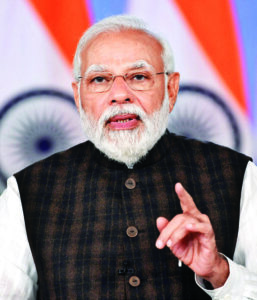The tragic tale of death and devastation is being unfolded in Ukraine as the Russian armed forces continue their relentless invasion of their East European neighbor for over a week. While the horrendous scenes of human suffering, of people trapped in the war zone, have left the world chilled; rival global powers involved in the proxy war — US-led NATO and Russia — are blaming each other, adding fuel to the fire.
INDIA MATTERS
Resisting immense pressure from both sides, Prime Minister Narendra Modi boldly adopted a path of neutrality while reiterating India’s commitment to the cardinal principle of the United Nations Charter and the International Law that mandates resolution of disputes between two countries through negotiation and not war.

PM Modi remained in constant touch with Russian President Vladimir Putin and US President Joe Bidden to convey India’s neutral stand with firmness and conviction. India abstained from voting on resolutions condemning Russia at the UN Security Council on February 25 as well as the UN General Assembly on March 2. While the UNSC resolution was vetoed by Russia, the General Assembly resolution is not binding on UN members.
While at the UN forums its independent stand in national interest circumvented the perception of supporting the US-led coalition against Russia, in the same breath, India has offered humanitarian help to the civilians trapped in the war-ravaged nations. New Delhi has been in touch with Russia, Ukrainian, and other countries to facilitate the evacuation of stranded non-combatants.
PM Modi is also in constant touch with world leaders and using his considerable influence to ensure an early end to the hostilities.
The Modi Government‘s balancing act on Ukraine is yet another demonstration of his assertion of India’s strategic autonomy. Earlier, New Delhi had distanced itself from the Beijing Olympics through an official boycott, which in many ways was projected and perceived as support of the US and the West in protest against China’s human rights violations.
The two decisions reflect two different assessments of its national interest vis-à-vis compulsions of the great power politics on New Delhi. While some interpreted India’s absence from the UNSC meets as the limitations of its closeness to the US (alongside tacit support for Russia), its boycott of the Beijing Olympics evinced a coming of age in its strategic autonomy characterized by strong, independent, and interest-based decision-making.
For India, the decision to carefully weigh on the Ukraine crisis has balanced three strategic necessities: Expectations of a close strategic partner in the US; the need to maintain strong ties with Moscow, and; to avoid any perception of proximity to the emerging Sino-Russian axis.
In unison, these three compulsions also narrate the story of India’s challenges today and the implicit need for a more accommodative evolution of its traditional strategic autonomy to a positioning that straddles balancing and hedging with occasional pushing.
India’s statement that it is closely monitoring the developments in Ukraine, including the diplomatic efforts between the US and Russia and its call for a peaceful resolution of the situation for long-term peace and stability in the region and beyond, showed a delicate balancing between the US and Russia.
In some ways, India’s position on the ongoing Ukraine crisis undergirded by the desire to keep clear of the crosshairs of big power rivalry is reminiscent of its quintessential ‘strategic autonomy’. Yet, its assurance of ‘monitoring’ the Ukrainian situation through its embassy in Kyiv and the dangers of perceptional support to one over the other has kept New Delhi’s balance in pragmatic check.














 G20 podium
G20 podium

